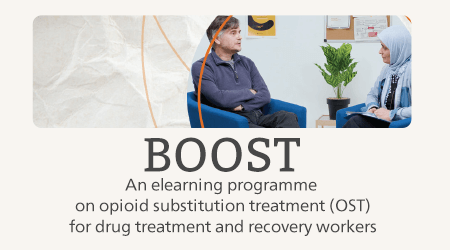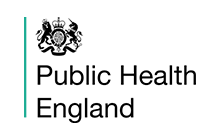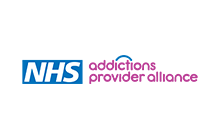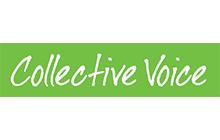

About the Best practice in Optimising Opioid Substitution Treatment (BOOST) elearning programme
The BOOST elearning programme aims to provide drug treatment and recovery professionals with the information they need to deliver good quality opioid substitution treatment (OST) to service users.
This elearning programme is recommended by Public Health England (PHE) as mandatory training for all drug treatment and recovery workers, whether working in the NHS, voluntary or private sectors. It is also recommended that team leaders, managers and other professionals working in drug treatment and recovery services complete the programme, so they can support learning and service improvements.
Drug treatment and recovery workers supported by their multidisciplinary teams play a crucial role in supporting service users to make informed choices and reach their treatment and recovery goals. This elearning programme will help you have more effective conversations about OST with service users and your wider team, including prescribers.
Drug misuse and dependence: UK guidelines on clinical management (also known as the ‘orange book’) outlines national guidance on best practice in drug treatment including OST. This programme is designed to support you to provide the best possible treatment for and with your OST service users in line with this clinical guidance.
Due to the coronavirus (COVID-19) pandemic, PHE have issued additional guidance to support services to provide OST.
To help you use what you have learned in practice, the elearning programme includes short videos featuring conversations between service users who are on OST and their drug treatment and recovery workers. These videos have been developed to demonstrate typical clinical scenarios.
About the elearning sessions
The elearning programme includes 6 sessions.
- Introduction to opioid substitution treatment (OST).
- How do I support service users to start OST?
- Optimising OST including continued use on top.
- How do I support someone to get the most out of OST?
- Optimising OST, including switching medication.
- How do I support service users to reduce and stop OST?
Each session takes approximately 30 minutes to complete. Sessions include further learning activities, links to further resources and a self-assessment.
Some of the sessions include short videos. These videos follow 2 characters who are on OST, Moira and Bill, and demonstrate key conversations between them and their drug treatment and recovery workers.
A brief guide to OST for drug treatment workers have also been developed.
A certificate is available for completion of all 6 sessions in the elearning programme. To obtain the certificate, learners will need to pass the final self-assessment.
More information
- This BOOST programme was developed by Public Health England (PHE) and members of its OST good practice programme working group, which has representatives from the organisations listed below.
- The programme was set up to improve the quality of OST delivery in England. The programme’s outputs focus on implementing existing clinical guidance through practical and user-friendly tools and resources.
- The elearning programme, developed with Health Education England eLearning for Healthcare (HEE elfh) is part of a collection of resources developed by the OST good practice programme.
Meet the team
The organisations represented in PHE’s OST good practice working group are:
- Avon and Wiltshire Mental Health Partnership NHS Trust
- Birmingham and Solihull Mental Health NHS Foundation Trust
- Build on Belief
- Central and North West London NHS Foundation Trust
- Change Grow Live
- Cumbria, Northumberland, Tyne and Wear NHS Foundation Trust
- Dorset County Council
- EDP Drug and Alcohol Services
- Essex County Council
- Foundations
- Inclusion Recovery Hampshire and Midlands Partnership Foundation Trust
- Lambeth Service User Involvement Council
- South London and Maudsley NHS Foundation Trust
- Surrey and Borders Partnership NHS Foundation Trust
- Turning Point
- We Are With You (formerly Addaction)
Acknowledgements:
We would also like to acknowledge the following who helped develop specific sections of the elearning programme:
- Raman Nijhawan, Build on Belief and Change Grow Live
- Cumbria, Northumberland Tyne and Wear NHS Trust
- Lambeth Service User Council
- Surrey and Borders Partnership NHS Foundation Trust
- Turning Point
elfh Project Team

Emma Nye
Programme Manager, HEE elearning for Healthcare
Moz Cammack
Project Manager, HEE elearning for Healthcare
Angelina Montinaro
Instructional Designer, HEE elearning for Healthcare
Jo Bloom
Learning Designer, HEE elearning for Healthcare
Simon Perkins
Learning Designer, HEE elearning for Healthcare
Catherine Moran
Graphic Designer, HEE elearning for Healthcare
Rashmi Chavda
Graphic Designer, HEE elearning for Healthcare
Rachel Gowland
Communications and Stakeholder Officer, HEE elearning for healthcare, Technology Enhanced Learning
How to access
Available to all
The Best Practice in Optimising Opioid Substitution Treatment (BOOST) elearning programme is freely available to access here.
Please note your progress and completion of sessions will not be recorded and you will not be able to generate a record of completion. If you require evidence of learning, please register and then log in to access this programme on the elfh Hub.
If you already have an account with elfh, then you can enrol on to the Best Practice in Optimising Opioid Substitution Treatment (BOOST) elearning programme by logging in to the elfh Hub, selecting My Account > Enrolment and selecting the programme. You can then access the programme immediately in the My elearning section.
To view the Best Practice in Optimising Opioid Substitution Treatment (BOOST) elearning programme, select the View button below. If you already have an account with elfh, you will also be able to login and enrol on the programme from the View button.
NHS healthcare staff in England
The Best Practice in Optimising Opioid Substitution Treatment (BOOST) elearning programme is also available to NHS healthcare staff via the Electronic Staff Record (ESR). Accessing this elearning via ESR means that your completions will transfer with you throughout your NHS career.
Further details are available here.
Registering large numbers of users
If you are a HR, IT or Practice Manager and would like to register and enrol large numbers of staff within your organisation for access onto the Best Practice in Optimising Opioid Substitution Treatment (BOOST) elearning programme, please contact elfh directly.
Organisations wishing to use their own LMS
For HR departments wanting to know more about gaining access to courses using an existing Learning Management System please contact elfh directly to express interest.
More information
Please select the following link for more information on how to use the elfh Hub.
Disclaimer
This elearning programme has been developed to assist and support drug treatment and recovery workers in developing good practice. This programme does not override or replace national and clinical guidelines in any circumstances. Drug misuse and dependence: UK guidelines on clinical management (also known as the ‘orange book’) remains the authoritative national guidance on drug treatment .




